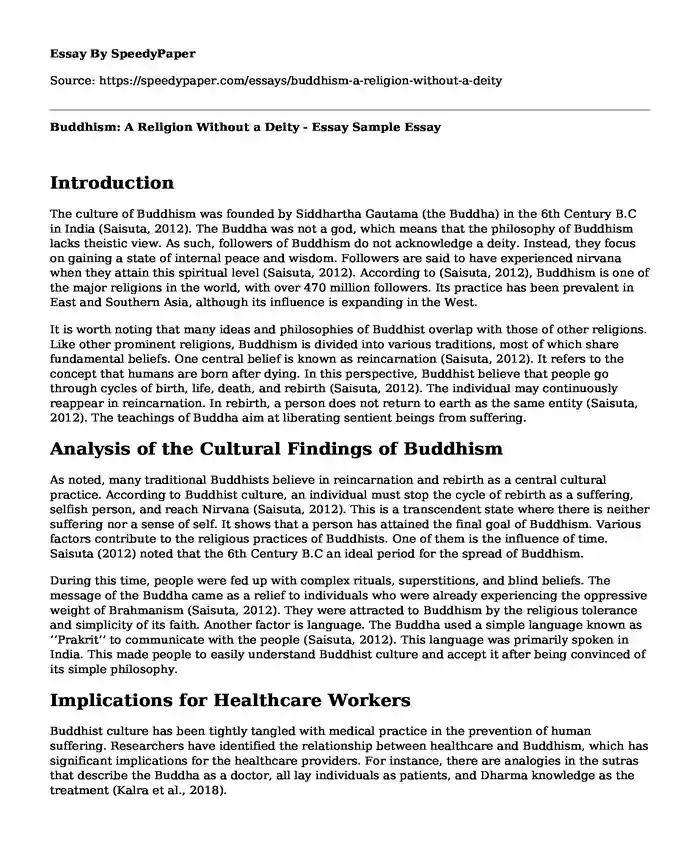
| Type of paper: | Essay |
| Categories: | Buddhism |
| Pages: | 3 |
| Wordcount: | 811 words |
Introduction
The culture of Buddhism was founded by Siddhartha Gautama (the Buddha) in the 6th Century B.C in India (Saisuta, 2012). The Buddha was not a god, which means that the philosophy of Buddhism lacks theistic view. As such, followers of Buddhism do not acknowledge a deity. Instead, they focus on gaining a state of internal peace and wisdom. Followers are said to have experienced nirvana when they attain this spiritual level (Saisuta, 2012). According to (Saisuta, 2012), Buddhism is one of the major religions in the world, with over 470 million followers. Its practice has been prevalent in East and Southern Asia, although its influence is expanding in the West.
It is worth noting that many ideas and philosophies of Buddhist overlap with those of other religions. Like other prominent religions, Buddhism is divided into various traditions, most of which share fundamental beliefs. One central belief is known as reincarnation (Saisuta, 2012). It refers to the concept that humans are born after dying. In this perspective, Buddhist believe that people go through cycles of birth, life, death, and rebirth (Saisuta, 2012). The individual may continuously reappear in reincarnation. In rebirth, a person does not return to earth as the same entity (Saisuta, 2012). The teachings of Buddha aim at liberating sentient beings from suffering.
Analysis of the Cultural Findings of Buddhism
As noted, many traditional Buddhists believe in reincarnation and rebirth as a central cultural practice. According to Buddhist culture, an individual must stop the cycle of rebirth as a suffering, selfish person, and reach Nirvana (Saisuta, 2012). This is a transcendent state where there is neither suffering nor a sense of self. It shows that a person has attained the final goal of Buddhism. Various factors contribute to the religious practices of Buddhists. One of them is the influence of time. Saisuta (2012) noted that the 6th Century B.C an ideal period for the spread of Buddhism.
During this time, people were fed up with complex rituals, superstitions, and blind beliefs. The message of the Buddha came as a relief to individuals who were already experiencing the oppressive weight of Brahmanism (Saisuta, 2012). They were attracted to Buddhism by the religious tolerance and simplicity of its faith. Another factor is language. The Buddha used a simple language known as ‘‘Prakrit’’ to communicate with the people (Saisuta, 2012). This language was primarily spoken in India. This made people to easily understand Buddhist culture and accept it after being convinced of its simple philosophy.
Implications for Healthcare Workers
Buddhist culture has been tightly tangled with medical practice in the prevention of human suffering. Researchers have identified the relationship between healthcare and Buddhism, which has significant implications for the healthcare providers. For instance, there are analogies in the sutras that describe the Buddha as a doctor, all lay individuals as patients, and Dharma knowledge as the treatment (Kalra et al., 2018).
The first implication is that the existence of the disease in the Buddhist culture is directly related to an individual's physical, mental, and spiritual health. Healthcare providers need to know that holistic care revolves around harmonizing these elements, and the Buddhist culture provides the physicians with great insight (Kalra et al., 2018).
The second implication is that the Buddhist medical literature establishes ethical guidelines for a healthcare practitioner based on the principles of medical ethics, namely; Nonmaleficence, benevolence, autonomy, and justice (Kalra et al., 2018).
The third implication is that nursing is a profession accompanied by burnout and stress. Mindfulness meditation observed in Buddhist culture, can help healthcare providers to cope with stress and design appropriate attributes to improve patient care (Kalra et al., 2018).
How Healthcare Worker Might Impact the Physiological, Psychological, Socio-Cultural, Developmental, and Spiritual Health of a Buddhist
Buddhist culture is based on spiritual and ethical values that show concern for the sick by helping them overcome suffering. In Buddhist tradition, Buddha was the first and primordial healer (Kalra et al., 2018). He was considered a great physician due to his wisdom and compassion for diagnosing and treating the primary cause of all physical and mental malaise. His teachings are found to be a course of therapy, and Buddhist meditation techniques have been applied in contemporary psychotherapy for various mental and chronic conditions (Kalra et al., 2018). In this perspective, a healthcare worker might impact the physiological, psychological, socio-cultural development, and spiritual health of someone from Buddhist culture by following the teachings and practices of Buddha while taking care of a sick person from this culture.
References
Kalra, S., Priya, G., Grewal, E., Aye, T. T., Waraich, B. K., SweLatt, T., et al. (2018). Lessons for the healthcare practitioner from Buddhism. Indian journal of endocrinology and metabolism, 22 (6), 812.
Saisuta, P. N. (2012). The Buddhist core values and perspectives for protection challenges: faith and protection. High Commissioner’s Dialogue Distr: General on Protection Challenges Theme: Faith and Protection.
Cite this page
Buddhism: A Religion Without a Deity - Essay Sample. (2023, Aug 14). Retrieved from https://speedypaper.net/essays/buddhism-a-religion-without-a-deity
Request Removal
If you are the original author of this essay and no longer wish to have it published on the SpeedyPaper website, please click below to request its removal:
- Essay Example: Sacraments of the Holy Matrimony and Holy Unction
- Analysis Essay Example on the Book of Esther
- Magic, Witchcraft, Death, and Religion. Paper Example
- Principles of Puritan Ideology - Free Essay Example
- Human Integrity: Its Value in Nursing and Biblical Perspective - Essay Sample
- Christian Ethics in 'The Peaceable Kingdom' and 'Doing Christian Ethics from the Margins' - Free Report
- The Angelic Encounter: A Tale of Love, Compassion, and Divine Blessings - Paper Sample
Popular categories




